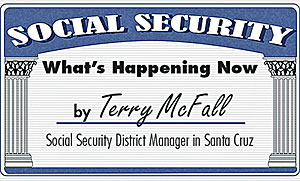Question: Will my Medicare coverage change because of the Affordable Care Act?
 Answer: No, not at all. People who have Medicare coverage are not affected by the Affordable Care Act. Medicare is not a part of the Affordable Care Act’s Health Insurance Marketplace. If you are a Medicare beneficiary, your Medicare benefits are not changing. You do not need to replace your Medicare coverage with Marketplace coverage. For more information about the Marketplace, visit www.healthcare.gov. For more information about Medicare Parts A, B, C, and D, visit www.medicare.gov. Or read our publication on Medicare at www.socialsecurity.gov/pubs.
Answer: No, not at all. People who have Medicare coverage are not affected by the Affordable Care Act. Medicare is not a part of the Affordable Care Act’s Health Insurance Marketplace. If you are a Medicare beneficiary, your Medicare benefits are not changing. You do not need to replace your Medicare coverage with Marketplace coverage. For more information about the Marketplace, visit www.healthcare.gov. For more information about Medicare Parts A, B, C, and D, visit www.medicare.gov. Or read our publication on Medicare at www.socialsecurity.gov/pubs.
Retirement
Question: What’s the average monthly Social Security benefit for a retired worker? How is the retirement benefit amount calculated?
Answer: The current average monthly Social Security benefit for a retired worker is $1,294. Social Security benefits are based on earnings averaged over most of a worker’s lifetime. Your actual earnings are first adjusted or “indexed” to account for changes in average wages since the year the earnings were received. We calculate your average monthly indexed earnings during the 35 years in which you earned the most. We apply a formula to these earnings and arrive at your basic benefit amount. Learn more by visiting us online at www.socialsecurity.gov.
Question: I am nearing my full retirement age, but I plan to keep working after I apply for Social Security benefits. Will my benefits be reduced because of my income?
 Answer: No. If you start receiving benefits after you’ve reached your full retirement age, you can work while you receive Social Security and your current benefit will not be reduced because of the earned income. If you keep working, it could mean a higher benefit for you in the future. Higher benefits can be important to you later in life and increase the future benefit amounts your survivors could receive. If you begin receiving benefits before your full retirement age, your earnings could reduce your monthly benefit amount. After you reach full retirement age, we recalculate your benefit amount to leave out the months when we reduced or withheld benefits due to your excess earnings. Learn more about Social Security reading our publication, How Work Affects Your Benefits, at www.socialsecurity.gov/pubs/10069.html.
Answer: No. If you start receiving benefits after you’ve reached your full retirement age, you can work while you receive Social Security and your current benefit will not be reduced because of the earned income. If you keep working, it could mean a higher benefit for you in the future. Higher benefits can be important to you later in life and increase the future benefit amounts your survivors could receive. If you begin receiving benefits before your full retirement age, your earnings could reduce your monthly benefit amount. After you reach full retirement age, we recalculate your benefit amount to leave out the months when we reduced or withheld benefits due to your excess earnings. Learn more about Social Security reading our publication, How Work Affects Your Benefits, at www.socialsecurity.gov/pubs/10069.html.
Disability
Question: How does Social Security decide whether I am disabled?
Answer: For an adult, disability under Social Security law is based on your inability to work because of a disabling condition. To be considered disabled, Social Security must determine that because of one or more disabling conditions you are unable to do the work you did before and unable to adjust to any other work which exists in significant numbers in the national economy. Also, your disability must last or be expected to last for at least one year or to result in death. Social Security pays only for total disability. No benefits are payable for partial disability or short-term disability (less than a year). For more information, we recommend you read Disability Benefits, available online at www.socialsecurity.gov/pubs.
Supplemental Security Income
Question: I get Supplemental Security Income (SSI) because I am elderly and have no income. My sister recently died and left me the money she had in a savings account. Will this extra money affect my SSI benefits? Will my SSI payments stop?
Answer: The money inherited from your sister is considered income for the month you receive it and could make you ineligible for that month, depending on the amount of the inheritance. If you keep the money into the next month, it then becomes a part of your resources.
You cannot have more than $2,000 in resources and remain eligible for SSI benefits ($3,000 for a couple). Call us at 1-800-772-1213 (TTY 1-800-325-0778) to report the inheritance. A representative will tell you how your eligibility and payment amount might be affected. Learn more by visiting us online at www.socialsecurity.gov.
Question: My parents recently moved into a retirement community and they are signing their house over to me. Can I still get Supplemental Security Income (SSI) or will home ownership make me ineligible?
Answer: You can own a home and still receive SSI as long as you live in the home you own. In most cases, when determining SSI eligibility we don’t count as a resource the home you own and live in or the car you use. For more information about SSI and Social Security, visit www.socialsecurity.gov, or call us at 1-800-772-1213 (TTY 1-800-325-0778).


